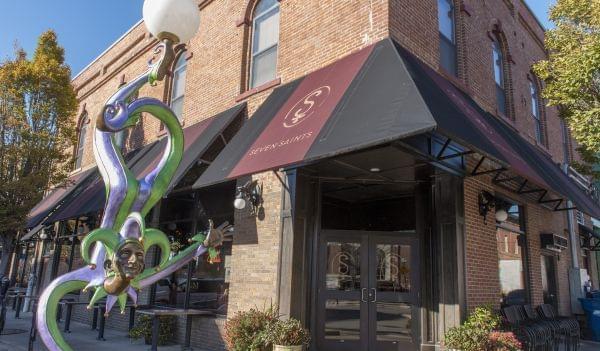Small Business Development Lagging In Champaign County

Seven Saints, 32 E. Chester St., Champaign, on Nov. 5, 2014, is one of seven small businesses opened before 2008 by Tifani Moot and two partners. Darrell Hoemann/CU-CitizenAccess.org
County small business development is still struggling under setbacks from the Great Recession and have not returned to pre-recession conditions, said a county economic development official.
Small business start-ups are still often unprepared for the amount of owner investment required by local commercial banks, said Kathy Larson, economic development specialist for the Champaign County Regional Planning Commission.
“In general, our clients have been struggling due to the lingering effects of the recession,” Larson said. “They are finding it more difficult to find the amount of financial support they would like.”
Lending regulations have changed to enforce higher criteria levels and a 20 percent to 25 percent down payment from business owners. But the lack of small business growth in the county can also be attributed to fewer applications for loans.
Cameron Moore, the chief executive officer of the county planning commission, said applications for small business loans have been very low, for both the Commission's four loan programs and the banks it frequently partners with.
He said this has contributed to the decrease in lending and drop in small business establishments across the county.
Indeed, the U.S. Census Bureau’s reports a steady decrease in the amount of Champaign County small businesses from 2007 to 2012 in their latest County Business Patterns data.
The number of small business establishments in Champaign County fell from 4,320 to 4,097, a 5.2 percent decrease, in the four years following the recession. The U.S. Small Business Administration (SBA) definition of a small business is “an independent business with fewer than 500 employees.”
Many businesses’ loan failures and insolvencies can be attributed to a lack of experience in skills and knowledge within a particular industry, as well as a lack of personal equity to invest into the business, Moore and Larson said.
These factors combined with the financial hardships of the recession resulted in the overall decrease, especially in restaurants, hotels and other food-service start-ups.
Moore said that for three to four years after the recession began, the Commission would not even consider these type of high-risk loan applicants. He said that this year the Commission started to consider those types of businesses.
Business loan applications have started to grow since the beginning of the year, Bryan Banks, assistant vice president and relationship manager at Busey Bank, said.
“Really over the last year or so, I personally have seen a lot more requests come across my desk or I’m out talking to prospective clients. They’re looking for growth,” he said.
In addition to applicants’ initiatives, Busey Bank is also trying to contribute to the economic boost.
In 2011, the bank announced its exit from the Troubled Asset Relief Program and received $72.6 million in preferred stock from the Small Business Lending Fund (SBLF). This along with its own $27.4 million investment was used to exit the fund and invest in the bank’s business lending initiatives.
“It helped us from the standpoint that we were able to lower our cost of capital and a certain percentage of our debt,” Banks said. “It assisted us in making loans (of up to $10 million) to small businesses that were $50 million in annual revenue or less. It was a great way for us to inject funds back into all of our various areas.”
The fund, along with Busey’s Preferred Lender Program (PLP) status from the SBA, has allowed the bank to provide for more small business applicants as well as respond to requests more quickly in efforts to encourage more businesses to apply.
“It enables us to give small business owners quick decisions and approvals in order to fund their lending needs within the matter of one to two weeks basically, from application to approval,” he said. “So it’s been a great opportunity for us to partner with local businesses and get them decisions on important issues as far as growth and additional funding in a very quick manner.”
Tifani Moot, a Champaign business co-owner of ten small businesses so far with Carlos and Marco Nieto, noted recent hardships and business failures since the recession, but emphasized the existing opportunities and positive upturn for future business.
Of the trio’s seven businesses before 2008 — including the Highdive, Cowboy Monkey and Seven Saints — they have also opened three new establishments over the last six years, including a family restaurant Uncle Jack’s.
“We opened Uncle Jack's two months after the big 2008 crash. It was devastating to us. Uncle Jack's closed within two years. That was our first real taste of failure,” Moot said. “I would like to add that in hindsight, it was not only the recession that hampered our success there. It was also our preoccupation with so many other businesses.”
Following another failure of Cabo’s, a Mexican restaurant located in southwest Champaign that close in 2013 two weeks after opening, Moot said the business trio are still looking for new ventures, specifically in downtown Champaign.
“Some projects have fallen through; however we are full steam ahead with our first project and are getting plans together for the following two,” she said.
Both Moore and Banks hope the financial resources in Champaign County are enough to encourage more business-interested owners such as Moot to seek loans and contribute to the county’s economic growth.
“Before (the recession), pretty much every year (the Commission would) loan out every penny we had available. And we’re sitting on a couple million dollars now, because people are just not borrowing money,” Moore said. “I guess they’re still nervous about the state of the economy.”
